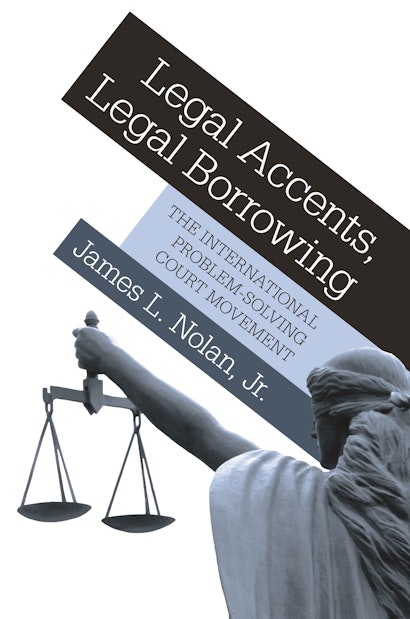A wide variety of problem-solving courts have been developed in the United States over the past two decades and are now being adopted in countries around the world. These innovative courts—including drug courts, community courts, domestic violence courts, and mental health courts—do not simply adjudicate offenders. Rather, they attempt to solve the problems underlying such criminal behaviors as petty theft, prostitution, and drug offenses. Legal Accents, Legal Borrowing is a study of the international problem-solving court movement and the first comparative analysis of the development of these courts in the United States and the other countries where the movement is most advanced: England, Scotland, Ireland, Canada, and Australia. Looking at the various ways in which problem-solving courts have been taken up in these countries, James Nolan finds that while importers often see themselves as adapting the American courts to suit local conditions, they may actually be taking in more aspects of American law and culture than they realize or desire. In the countries that adopt them, problem-solving courts may in fact fundamentally challenge traditional ideas about justice. Based on ethnographic research in all six countries, the book examines these cases of legal borrowing for what they reveal about legal and cultural differences, the inextricable tie between law and culture, the processes of globalization, the unique but contested global role of the United States, and the changing face of law and justice around the world.
"Nolan takes an ethnographic approach to the study of alternative courts to counter the idea that law can simply be transplanted, unchanged, from one environment to another. . . . Nolan does an excellent job of exploring how culture affects legal borrowing, and his work is of considerable value both to scholars of comparative law and to judges, lawyers, and other practitioners who deal with legal change."—Choice
"The scope of this work is truly impressive as Nolan makes multiple visits to England, Wales, Ireland, Scotland, Australia, and Canada to examine more than 50 courts, conducting hundreds of interviews and observations. The result is a well-researched, well-told, well-analyzed, sometimes humorous account. . . . As in his earlier work, Nolan brilliantly combines theory and empirical research. . . . This book makes a tremendous contribution."—Rekha Mirchandani, Law & Society Review
"[T]his is a necessary and useful book for readers who study problem-solving courts, especially those that track the development as well as the internalization of the movement surrounding the growth of these courts. Those interested in how law and culture can or cannot be successfully imported will also benefit from reading Legal Accents. Most specifically, critics of American cultural imperialism—regardless of interest in problem-solving courts—should read this book. . . . For readers in all these categories, I definitely recommend Legal Accents as a must-read. For others, the book still belongs to the book shelf space containing ready references about noteworthy subjects."—Salmon A. Shomade, Law & Politics Book Review
"Nolan's research is an unmatched contribution to the nascent field of knowledge concerning [problem-solving courts]. . . . His rich court observations are coupled with fascinating data gleaned from interviews with judges and other court officials."—Dawn Moore, Punishment & Society
"This is a first-rate study in every respect. It does so good a job of showing why the recent development of problem-solving courts deserves attention that it simply acts to create an audience where one did not exist before. I was drawn in from the first page. Thoughtful and well-crafted, the book sets a high standard."—Kai Erikson, professor emeritus, Yale University
"Why are American criminal justice innovations so influential even in countries characterized by strong dislike of American cultural imperialism? When legal institutions are imported from abroad is it possible to filter out wider cultural assumptions and practices? In this well-argued and innovative study, James Nolan examines such questions by focusing on how American-style problem-solving courts have been adapted in five other common law jurisdictions. This is a fine and timely illustration of the complexities of cultural borrowing."—David Nelken, Cardiff Law School
"With Reinventing Justice, James Nolan established himself as the leading expert on America's problem-solving court movement. Now, with Legal Accents, Legal Borrowing, he has extended his reach and established himself as one of the world's leading experts on the powerful movement to promote these courts internationally. Cosmopolitan and erudite, this book can be read with enormous profit by students, scholars, and practitioners on at least three continents."—Malcolm M. Feeley, School of Law, University of California, Berkeley
"James Nolan is one of the leading scholars of problem-solving courts, and to my knowledge this is the only book offering a comprehensive account of the development of these courts around the English-speaking world. Legal Accents, Legal Borrowing is clear and insightful and has a terrific blend of theory and description."—Richard C. Boldt, University of Maryland Law School
"I looked forward to reading this book and was not disappointed. James Nolan has made the subject of problem-solving courts his own. He raises timely and important questions, and writes with an easy, flowing style."—Philip Bean, author of Madness and Crime


